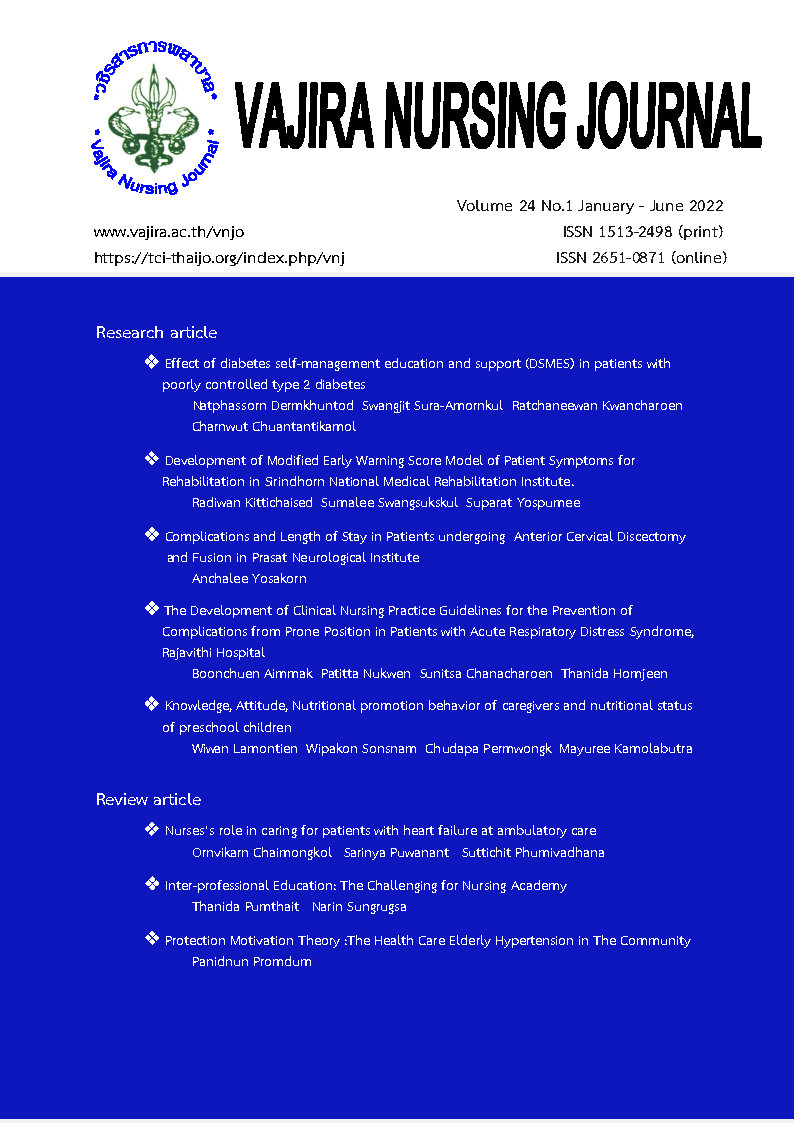การเกิดภาวะแทรกซ้อนและจำนวนวันนอนในโรงพยาบาลของผู้ป่วยที่ได้รับการผ่าตัดกระดูกสันหลังระดับคอทางด้านหน้าและการเชื่อมข้อในสถาบันประสาทวิทยา
Main Article Content
บทคัดย่อ
การวิจัยเชิงบรรยายนี้มีวัตถุประสงค์เพื่อศึกษาการเกิดภาวะแทรกซ้อนและจำนวนวันนอนโรงพยาบาลในผู้ป่วยที่ได้รับการผ่าตัดกระดูกสันหลังระดับคอทางด้านหน้าและการเชื่อมข้อ โดยศึกษาแบบย้อนหลังจากเวชระเบียนของผู้ป่วยที่ได้รับการผ่าตัดกระดูกสันหลังระดับคอทางด้านหน้าและการเชื่อมข้อ ในสถาบันประสาทวิทยา ระหว่างวันที่ 1 ตุลาคม พ.ศ. 2560 ถึง วันที่ 30 กันยายน พ.ศ. 2562 จำนวน 226 ราย วิเคราะห์ข้อมูลโดยใช้สถิติเชิงบรรยายหาความถี่ ร้อยละ ค่าเฉลี่ย และส่วนเบี่ยงเบนมาตรฐาน
ผลการศึกษาพบว่าเกิดภาวะแทรกซ้อนหลังการผ่าตัดร้อยละ 65 ส่วนใหญ่คือภาวะท้องผูก และภาวะของระดับโพแทสเซียมในเลือดต่ำกว่าปกติ ร้อยละ 55.8 และ 11.9 ตามลำดับ ด้านภาวะแทรกซ้อนทางวิสัญญี พบอาการคลื่นไส้อาเจียนและอาการเจ็บคอ ร้อยละ 16.4 และ 11.5 ตามลำดับ และพบว่ามีความผิดปกติของระบบต่าง ๆ ในร่างกายระหว่างการผ่าตัด ได้แก่ ปัญหาของระบบไหลเวียนของหัวใจและหลอดเลือด และระบบทางเดินปัสสาวะ ร้อยละ 34.5 และ 11.5 ตามลำดับ ในส่วนของจำนวนวันนอนโรงพยาบาล พบว่าโดยภาพรวมผู้ป่วยที่ได้รับการผ่าตัดกระดูกสันหลังระดับคอทางด้านหน้าและการเชื่อมข้อหลายระดับ มีจำนวนวันนอนโรงพยาบาล ระหว่าง 2 - 45 วัน และมีค่าเฉลี่ยวันนอนโรงพยาบาล เท่ากับ 7.73 (SD=4.736 ) และผู้ป่วยที่ได้รับการผ่าตัดกระดูกสันหลังจำนวน 5 ระดับ มีจำนวนวันนอนโรงพยาบาล ระหว่าง 2 - 14 วัน และค่าเฉลี่ยวันนอนโรงพยาบาล เท่ากับ 8.27 (SD=3.003 )
Article Details

อนุญาตภายใต้เงื่อนไข Creative Commons Attribution-NonCommercial-NoDerivatives 4.0 International License.
เนื้อหาและข้อมูลในบทความที่ลงตีพิมพ์ในวชิรสารการพยาบาลถือเป็นข้อคิดเห็นและความรับผิดชอบของผู้เขียนบทความโดยตรง ซึ่งกองบรรณาธิการไม่จำเป็นต้องเห็นด้วย หรือร่วมรับผิดชอบใด ๆ ทั้งสิ้น
บทความ ข้อมูล เนื้อหา รูปภาพ ฯลฯ ที่ได้รับการตีพิมพ์ในวชิรสารการพยาบาล ถือเป็นลิขสิทธิ์ของวชิรสารการพยาบาล หากบุคคลใดหรือหน่วยงานใดต้องการนำทั้งหมดหรือส่วนหนึ่งส่วนใดไปเผยแพร่ต่อหรือเพื่อกระทำการใด ๆ จะต้องได้รับอนุญาตเป็นลายลักอักษรจากวชิรสารการพยาบาลก่อนเท่านั้น
เอกสารอ้างอิง
Bureau of Epidemiology Department of Disease Control Ministry of Public Health. (2011). Chronic Diseases Surveillance Report, 2012 Retrieved 12 June 2020 http://www.boe.moph .go.th/files/report/20140109_40197220.pdf
Bovonratwet, P., Fu, M. C., Tyagi, V., Bohl, D. D., Ondeck, N. T., Albert, T. J., & Grauer, J. N. (2019). Incidence, risk factors, and clinical implications of postoperative hematoma requiring reoperation following anterior cervical discectomy and fusion. Spine, 44(8), 543-549.
Debono, B., Corniola, M. V., Pietton, R.,
Sabatier, P., Hamel, O., & Tessitore, E. (2019). Benefits of enhanced recovery after surgery for fusion in degenerative
spine surgery: impact on outcome, length of stay, and patient Neurosurgical focus, 46(4), E6.
Desai, A., Ball, P. A., Bekelis, K., Lurie, J., Mirza, S. K., Tosteson, T. D., . . . Weinstein, J. N. (2012). Surgery for lumbar degenerative spondylolisthesis in SPORT: Does incidental durotomy affect outcome? Spine, 37(5), 406-413. doi:10. 1097/BRS.0b013e3182349bc5
Dial, B. L., Esposito, V. R., Danilkowicz, R., O’Donnell, J., Sugarman, B., Blizzard, D. J., & Erickson, M. E. (2020). Factors associated with extended length of stay and 90-day readmission rates following ACDF. Global spine journal,
(3), 252-260.
Epstein, N. E. (2019). A Review of Complication Rates for Anterior Cervical Diskectomy and Fusion (ACDF). Surg Neurol Int, 10, 1-8. doi:10.25259/SNI-191-2019
Inthira Roopsawang, Suparb Aree-Ue, & Putwatana, P. (2009). A Follow-Up Study of Health Status in Patients with Chronic Low Back Pain before and after Spinal Surgery. Rama Nurs J, 15(3), 344-360.
Knutsson, B., Michaelsson, K., & Sanden, B. (2013). Obesity is associated with inferior results after surgery for lumbar spinal stenosis: a study of 2633 patients from the Swedish spine register. Spine (Phila Pa 1976), 38(5), 435-441.doi:10.1097/BRS.0b013e 318270b243
Kovacs, F. M., Urrutia, G., & Alarcon, J. D. (2011). Surgery versus conservative treatment for symptomatic lumbar spinal stenosis: a systematic review of randomized controlled trials. Spine (Phila Pa 1976), 36(20), E1335-1351. doi:10.1097/BRS.0b013e31820c97b1
Malik, A. T., Khan, S. N., Kim, J., & Yu, E. (2019). 30-Day Postoperative Morbidity and Readmission Following Revision Anterior Cervical Discectomy and Fusion (ACDF). Clinical spine surgery, 32(10), 435-438.


